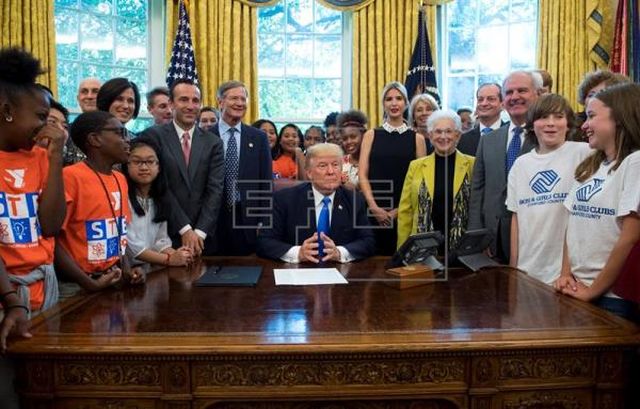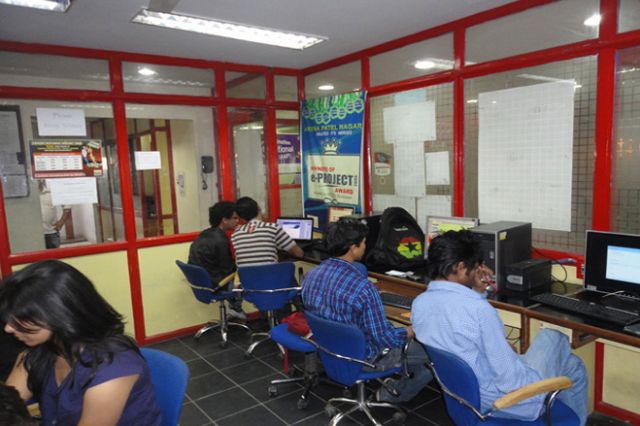
by Editor | May 25, 2021 | World
 Washington : US President Donald Trump on Monday ordered the Education Department to invest at least $200 million annually in grants funding schools in the country so they can expand their teaching in the areas of STEM (science, technology, engineering and math).
Washington : US President Donald Trump on Monday ordered the Education Department to invest at least $200 million annually in grants funding schools in the country so they can expand their teaching in the areas of STEM (science, technology, engineering and math).
“Greater access to STEM and computer science programs will ensure that our children can develop the skills they need to compete and to win in the workforce of tomorrow,” Efe quoted Trump as saying.
The president signed a memorandum instructing his Secretary of Education Betsy DeVos to prioritise educational projects related to STEM and computer science when it comes to distributing funds to schools.
“Currently, more than half of high schools do not offer computer programming, and nearly 40 per cent do not offer physics,” Trump said.
Trump’s daughter and adviser, Ivanka Trump, explained in a telephone conference call that the aim of the initiative is “aligning the skills that are taught in the classroom with the skills that are in demand in the modern economy.”
“So we’re very excited about today’s announcement and towards really focusing on the goal of putting Americans to work and making sure that all Americans get great-paying jobs,” Ivanka Trump added.
The president, for his part, suggested students to engage themselves in the future to “do what you love – but then it’s not work. Because if you love it, it’s not working. It’s like a pleasure.”
—IANS

by Editor | May 25, 2021 | Business Ideas, Entrepreneurship, Startup Basics, Your Business Plan
 New Delhi : Microsoft has supported over 4,000 Indian start-ups, skill training for 30,000 youth and helped train 26,000 teachers while working with several state governments and not-for-profit organisations between April 2016 and March 2017 in India, a new report said on Friday.
New Delhi : Microsoft has supported over 4,000 Indian start-ups, skill training for 30,000 youth and helped train 26,000 teachers while working with several state governments and not-for-profit organisations between April 2016 and March 2017 in India, a new report said on Friday.
In its 2017 India Citizenship Report, Microsoft India said it recognises that India’s entrepreneurial landscape would aid robust economic growth in the coming years and was committed to contributing to the Indian start-up growth story.
The company supported and guided the start-ups with programmes like BizSpark, Microsoft Accelerator, among others.
BizSpark, a Microsoft flagship initiative, is aimed at supporting early stage start-ups. More than 100 Indian start-ups were selected under the BizSpark Plus programme in 2016-17 which helped them grow their customer base.
Microsoft Accelerator empowered start-ups on their journey to build great companies, working with market-ready start-ups and provide the tools, resources, connections, knowledge and expertise that they need to become successful companies.
The Microsoft Cloud Accelerator Programme served to accelerate the adoption of services such as Microsoft Azure and transform business and governance in a mobile-first and cloud-first world.
Under Project Shiksha, Microsoft India trained over 8,124 teachers in Tamil Nadu, Rajasthan and Madhya Pradesh, impacting 361,000 students.
Under Project Saksham, Microsoft has conducted trainings for over 3,307 educators across 123 universities. These faculty members have, in turn, trained 1,126 of their peers. In 2016-17, 661 teachers across 21 universities were trained.
As part of the Microsoft Educator Community programme, the Maharashtra government adopted the QR Coded textbook idea catalysed by a Microsoft India Educator Rajintsinh Disale, which allows teachers to receive additional resources and information related to a textbook by simply scanning a QR code.
In line with government’s Skill India vision, the company brought Predictive Analysis and Machine Learning technologies to education, healthcare and agriculture in partnership with several state governments.
The company’s integrated cloud-first, mobile-first solutions have improved processes, productivity and mobility, in order to accelerate India’s digital transformation.
Microsoft Philanthropies has invested over $10 million in cash and technology to transform the way non-profits deliver impact in India, offering educational opportunities to the next generation.
—IANS

by Editor | May 25, 2021 | Corporate, Corporate Buzz, Employment
 By Saurabh Sinha,
By Saurabh Sinha,
Mumbai : Aiming to skill students to enhance their employability, global 3D experience major Dassault Systemes is planning to forge partnerships with academic universities to create more visibility for better outreach.
The company intends to support the future generation through various training programmes that will boost the government’s ‘Skill India’ initiative, a top company executive has said.
“We want to do more aggressive partnership with universities and make those connections more visible because they are key to the ‘Skill India’ initiative — both at the centre and the state level,” Samson Khaou, Managing Director, Dassault Systemes India, told IANS on the sidelines of its ‘3DEXPERIENCE FORUM 2017’ event here last week.
“We want to enforce our partnership with the education sector, whether it’s vocational training, engineering colleges and universities or Center of Excellence for under-graduates and post-graduates. We are supporting the future generation of the country,” Khaou added.
Dassault Systemes has announced the commencement of the first and second batch of the Aerospace and Defense Centre of Excellence (CoE) in Bengaluru, which was set up at the Visvesvaraya Technological University (VTU) in association with the Karnataka government.
The first two batches will have 50 students undergoing one month-long foundation course. The company is also planning to launch an advanced course of four months on overall Aircraft Design and Development process, Structural Engineering and Equipment Engineering.
The company, in 2015, had partnered with Centurion University of Technology and Management, Odisha (CUTM) to offer a virtual design and digital manufacturing programme.
While Khaou maintained that the manufacturing domain remains the core business, the company, with its business-to-business-for-consumer (‘B2B-for-C’) approach, is also focusing on consumer experience.
“Through our ‘B2B-for-C’ approach, we want to enable the customers (businesses) we are serving to create or design experiences for their consumer and make those experiences omni-channel by making them available both online and via retail using the ‘3DEXPERIENCE’ platform,” Khaou noted.
As per its ‘open innovation community’ strategy, the company has also collaborated with several startups in the country, which have agility and creativity to leverage the technology, to help them adapt to the global market needs.
“This is very important because now the focus on Digital India is going to boost the Startup (India) initiative. The startup model is no longer the classical way — ‘start local, go global’ as it is now ‘go global at first’,” said Khaou.
“They can leverage the bigger marketplace based on our platform to support the global approach,” he added.
The company is also targeting to leverage the vast potential of the retail and apparel market in India.
It has collaborated with major apparel brands like Aditya Birla Fashion and Retail Ltd, Arvind Lifestyle Brands Limited, Mohan Clothing and Myntra.
(Saurabh Sinha can be contacted at saurabh.s@ians.in)
—IANS

by Editor | May 25, 2021 | Markets, News, Technology
 Thiruvananthapuram : As many as 60,000 government high school students in Kerala will be taught animation, electronics, hardware, cyber-safety and Malayalam computing at a two-day camp next month, officials said on Monday.
Thiruvananthapuram : As many as 60,000 government high school students in Kerala will be taught animation, electronics, hardware, cyber-safety and Malayalam computing at a two-day camp next month, officials said on Monday.
The ‘Hi School Kuttikootam’ programme, organised by the state Kerala Infrastructure and Technology for Education (KITE), aims at empowering the students in these fields by giving them regular training. It would be held between September 7-10 at 1,531 centres across the state.
“Hi-School Kuttikkootam has indeed become the largest student network of its kind in ICT in India. These students would in turn train other students in their schools. As many as one million students would be directly benefited immediately by this training in the coming days and this would have a larger and visible impact in the society,” said K. Anvar Sadath, Vice Chairman and Executive Director of KITE.
Tasks that the children would undergo include preparation of circuits in the electronic kits at schools, use of raspberry mini-computer and development of edutainment softwares using visual programming application Scratch.
Other areas that would be covered include specific training for students focussing on Internet discipline, cyber safety and privacy ensuring mechanisms, updates in ‘Schoolwiki’, formation of school news desk and online publishing of school news.
The hardware part would equip the students in that group to operate and maintain the ICT equipment provided to classrooms, necessary software installations and rectify connectivity issues.
—IANS

by Editor | May 25, 2021 | Markets, Technology, World
 San Francisco : Tech giant Apple on Saturday announced that its “App Development with Swift” curriculum will be offered in over 30 community colleges across the United States in 2017-2018 school year.
San Francisco : Tech giant Apple on Saturday announced that its “App Development with Swift” curriculum will be offered in over 30 community colleges across the United States in 2017-2018 school year.
The course will enable the students with no programming experience to build their own fully-functional apps.
“We believe passionately that the opportunity should be extended to everyone and community colleges have a powerful reach into communities where education becomes the great equaliser,” said Apple CEO Tim Cook in a statement.
The company is aiming to prepare the students to build careers in software development and Information Technology.
Several community colleges like Austin Community College District, Northeast Mississippi Community College, Northwest Kansas Technical College and campuses in the Alabama Community College System have added the curriculum for the session.
“Apple is going to be a force multiplier in the community’s ongoing efforts to lift 10,000 people out of poverty and into good jobs over the next five years,” said Austin Mayor Steve Adler.
Apple’s app economy supports 1.5 million jobs in the US. In 2016, software developers in the US earned $5 billion through the App Store, a 40 per cent increase over 2015.
—IANS

 Washington : US President Donald Trump on Monday ordered the Education Department to invest at least $200 million annually in grants funding schools in the country so they can expand their teaching in the areas of STEM (science, technology, engineering and math).
Washington : US President Donald Trump on Monday ordered the Education Department to invest at least $200 million annually in grants funding schools in the country so they can expand their teaching in the areas of STEM (science, technology, engineering and math).



